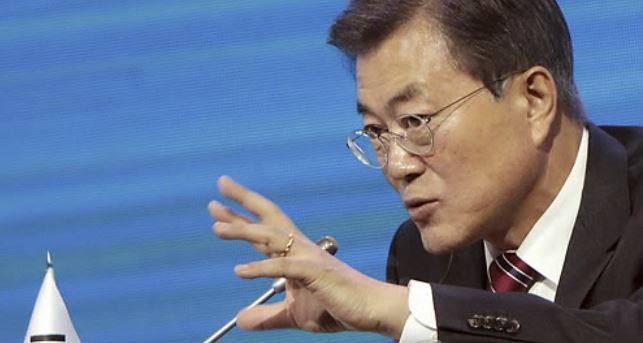Moon says Korea will neither develop nor possess nuclear arms
By YonhapPublished : Nov. 1, 2017 - 10:23
South Korea will neither develop nor possess nuclear arms, President Moon Jae-in said Wednesday, amid conservative opposition parties' call to redeploy US tactical nuclear weapons.
Moon also renewed his call on North Korea to give up its nuclear ambitions.
"In accordance with the declaration of denuclearization jointly announced by the South and the North, a nuclear-armed North Korea can neither be tolerated nor accepted. We too will not develop or possess nukes," the president said in his second state of the nation address at the National Assembly.
The national address came as the government was set to submit its budget bill to the parliament, requesting a 7.1 percent spike in its spending to 429 trillion won ($383.9 billion) in 2018.
The opposition parties have recently been calling for a redeployment of US tactical nukes here to counter North Korea's enhancing asymmetrical weapons of war. Such a call quickly gained momentum after the communist North staged its sixth and most powerful nuclear test so far in September.
Hong Joon-pyo, head of the main opposition Liberty Korea Party, even flew to the United States last week on a self-imposed mission to convince US policymakers to consider redeploying US tactical nuclear arms to South Korea.

President Moon said the government's foremost goal was to establish peace.
"What we want to realize is peace on the Korean Peninsula. Therefore, there can never be any armed conflict on the Korean Peninsula under any circumstances. There cannot be any military action on the Korean Peninsula without a prior consent of the Republic of Korea," he said, referring to his country by its official name.
However, the president vowed maximum retaliation against any military provocation from the North.
"To this end, we must secure overwhelming power. We will also closely work with the international community, based on the strong Korea-US alliance," Moon said.
He also stressed the importance of maintaining what he has called maximum pressure and sanctions on the North, calling them a way to bring North Korea to the dialogue table.
"We must decide the fate of our own nation," the president said. "We will not repeat the unfortunate history of having our fate decided regardless of our wishes, such as the (Japanese) colonial rule (of Korea) and the division (of the two Koreas)."
Regarding the economy, the president said his government was working to put the economy back on the right track, insisting the experience of hardship during the 1997 Asian Financial Crisis still haunted many people and firms, as well as government policies.
"The South Korean economy has completely changed from when it faced the possibility of a national default. The aftermath completely changed the lives of the people. Low growth and unemployment have become structurized, while the pride of being a middle class person vanished. Each and everyone was left alone to save his or herself and their families under a belief that a small government was the virtue," Moon said.
Moon said his new people and innovation-oriented economic policy sought to overhaul such beliefs and make the government more responsible for the welfare and livelihood of the people.
"A people-oriented economy is a bold change for ourselves and our future generations. I believe now is the right time for change," he said.
Such a change should start with how wealth is distributed, the president said, noting large family-run businesses, called chaebol, may be taking too much while their employees may not get what they deserve.
"A chaebol-centered economy quickly pulled us out from poverty. It enabled astonishing economic development that no other country has realized since the end of World War II. But it can no longer ensure our future as seen in our stagnant growth and tiring lives of the people," he said.
President Moon assured that proposed government spending for next year could start amending the situation, saying it largely sought to create more jobs, boost household income and enhance public safety and security.
"First, the government greatly increased the budget for new jobs. It is the most urgently needed budget for our people and especially our youth. Our economy has recently showed signs of improvement, and if the employment conditions improve as well, the economy will be grow at a faster rate," he said.
The president also urged the parliament to begin discussions on the Constitutional amendment, noting the move needs to be put to a national vote in the local elections in June to make it possible.
"Should we miss that opportunity, it will not be easy to win public support for a Constitutional revision," he said.
The planned revision, he said, must seek to expand the people's basic rights while intensifying the autonomy of local governments.
The president also stressed the need to involve ordinary citizens in the discussion.
"A constitutional amendment must be a people-led revision both in its content and process. It must be a revision to reform politics and guarantee that sovereignty rests with the people," he said. (Yonhap)




![[Herald Interview] 'Amid aging population, Korea to invite more young professionals from overseas'](http://res.heraldm.com/phpwas/restmb_idxmake.php?idx=644&simg=/content/image/2024/04/24/20240424050844_0.jpg&u=20240424200058)

![[Pressure points] Leggings in public: Fashion statement or social faux pas?](http://res.heraldm.com/phpwas/restmb_idxmake.php?idx=644&simg=/content/image/2024/04/23/20240423050669_0.jpg&u=)













